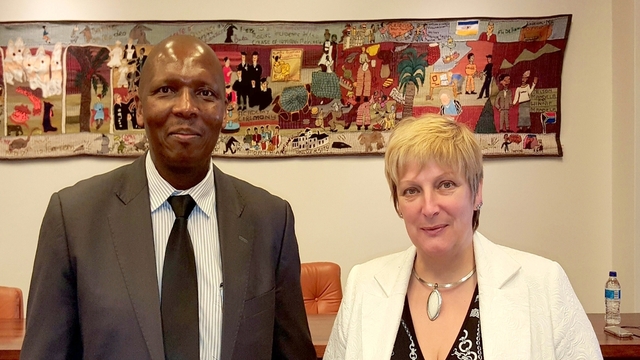
By Orla Quinlan
Rhodes University recently hosted Chief Mabizela, Chief Director of higher education policy for the Department of Higher Education and Training (DHET) to engage on the draft Policy Framework for Internationalisation of Higher Education in South Africa as part of International Week.
Mabizela engaged with the senior leadership and academics on the draft policy framework, as the policy permeates every aspect of a higher education institution.
Higher Education Minister, Blade Ndzimande has called for the public to submit comments until the end of June 2017.
The Chief Director explained that while different institutional policies and strategies must be aligned and be within the parameters set for the higher education system of South Africa, the policy framework simultaneously provides enough room for creativity and innovation.
The policy framework defines internationalisation of higher education as an intentional or steered process to integrate or infuse intercultural, international and global dimensions in higher education; to advance the goals, functions and delivery of higher education and thus to enhance the quality of education and research.
“We have consultation plans, including the statutory-mandated consultation for advice with the Council on Higher Education (CHE), which would end with a Policy Framework for Internationalisation of Higher Education in South Africa on or before 31 March 2018,” he re-assured.
While the policy framework does not condone the commercialisation of higher education, it does not bar institutions from generating income, primarily in order to sustain the activities relating to internationalisation. The new proposals supporting cross-border joint degrees were welcomed by the Rhodes academics in attendance.
Academics engaged in cross-border teaching, such as the Rhodes post-graduate education programme in Namibia were invited to be propositional, if certain policy framework content might hinder their endeavours in the current form.
The policy outlines the responsibilities of government, which includes policy integration; inter-departmental coordination and cooperation among the affected and relevant government departments.
Mabizela concluded that the draft framework “commits that there will be no direct steering of internationalisation…internationalisation must primarily happen at institutional level with government providing support and endeavouring to create a conducive environment for internationalisation to flourish”.
Although there is no immediate commitment to funding being made available for internationalisation, Mabizela did not rule it out for the future. While there will be some new mandatory reporting requirements, Rhodes University is currently engaged in many dimensions of internationalisation, as proposed in the policy framework.
The Draft policy framework is available on the link below. Specific propositional comments for the Rhodes University submission must be directed to o.quinlan@ru.ac.za by 23June 2017.
